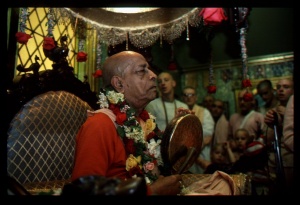CC Madhya 25.91: Difference between revisions
m (1 revision(s)) |
(Vanibot #0054 edit - transform synonyms into clickable links, which search similar occurrences) |
||
| (One intermediate revision by one other user not shown) | |||
| Line 1: | Line 1: | ||
{{ | [[Category:Sri Caitanya-caritamrta - Madhya-lila Chapter 25|C091]] | ||
<div style="float:left">'''[[Sri Caitanya-caritamrta|Śrī Caitanya-caritāmṛta]] - [[CC Madhya|Madhya-līlā]] - [[CC Madhya 25|Chapter 25: How All the Residents of Vārāṇasī Became Vaiṣṇavas]]'''</div> | |||
<div style="float:right">[[File:Go-previous.png|link=CC Madhya 25.90|Madhya-līlā 25.90]] '''[[CC Madhya 25.90|Madhya-līlā 25.90]] - [[CC Madhya 25.92|Madhya-līlā 25.92]]''' [[File:Go-next.png|link=CC Madhya 25.92|Madhya-līlā 25.92]]</div> | |||
{{CompareVersions|CC|Madhya 25.91|CC 1975|CC 1996}} | |||
{{RandomImage}} | |||
==== TEXT 91 ==== | ==== TEXT 91 ==== | ||
<div class="verse"> | |||
<div | :prabhu kahe,—"āmi 'jīva', ati tuccha-jñāna! | ||
prabhu kahe, | :vyāsa-sūtrera gambhīra artha, vyāsa-bhagavān | ||
vyāsa-sūtrera gambhīra artha, vyāsa-bhagavān | |||
</div> | </div> | ||
| Line 13: | Line 16: | ||
==== SYNONYMS ==== | ==== SYNONYMS ==== | ||
<div class="synonyms"> | |||
<div | ''[//vanipedia.org/wiki/Special:VaniSearch?s=prabhu&tab=syno_o&ds=1 prabhu] [//vanipedia.org/wiki/Special:VaniSearch?s=kahe&tab=syno_o&ds=1 kahe]'' — Lord Śrī Caitanya Mahāprabhu replied; ''[//vanipedia.org/wiki/Special:VaniSearch?s=āmi&tab=syno_o&ds=1 āmi] [//vanipedia.org/wiki/Special:VaniSearch?s=jīva&tab=syno_o&ds=1 jīva]'' — I am an insignificant living being; ''[//vanipedia.org/wiki/Special:VaniSearch?s=ati&tab=syno_o&ds=1 ati] [//vanipedia.org/wiki/Special:VaniSearch?s=tuccha&tab=syno_o&ds=1 tuccha]-[//vanipedia.org/wiki/Special:VaniSearch?s=jñāna&tab=syno_o&ds=1 jñāna]'' — My knowledge is very meager; ''[//vanipedia.org/wiki/Special:VaniSearch?s=vyāsa&tab=syno_o&ds=1 vyāsa]-[//vanipedia.org/wiki/Special:VaniSearch?s=sūtrera&tab=syno_o&ds=1 sūtrera]'' — of the Vedānta-sūtra, written by Vyāsadeva; ''[//vanipedia.org/wiki/Special:VaniSearch?s=gambhīra&tab=syno_o&ds=1 gambhīra] [//vanipedia.org/wiki/Special:VaniSearch?s=artha&tab=syno_o&ds=1 artha]'' — very grave meaning; ''[//vanipedia.org/wiki/Special:VaniSearch?s=vyāsa&tab=syno_o&ds=1 vyāsa]'' — Vyāsadeva; ''[//vanipedia.org/wiki/Special:VaniSearch?s=bhagavān&tab=syno_o&ds=1 bhagavān]'' — the Supreme Personality of Godhead. | ||
prabhu | |||
</div> | </div> | ||
| Line 21: | Line 23: | ||
==== TRANSLATION ==== | ==== TRANSLATION ==== | ||
<div class="translation"> | |||
<div | Śrī Caitanya Mahāprabhu replied, "I am an ordinary living being, and therefore My knowledge is very insignificant. However, the meaning of the Brahma-sūtra is very grave because its author, Vyāsadeva, is the Supreme Personality of Godhead Himself. | ||
Śrī Caitanya Mahāprabhu replied, | |||
</div> | </div> | ||
==== PURPORT ==== | ==== PURPORT ==== | ||
<div class="purport"> | |||
An ordinary living being cannot actually understand the meaning of the ''Vedānta-sūtra''. One can understand the meaning if he hears it from the authority, Vyāsadeva himself. For this purpose, Vyāsadeva gave a commentary on the ''Brahma-sūtra'' in the form of [[Srimad-Bhagavatam|''Śrīmad-Bhāgavatam'']]. He had been instructed to do this by his spiritual master, Nārada. Of course, Śaṅkarācārya distorted the meaning of the ''Brahma-sūtra'' because he had a motive to serve. He wanted to establish Vedic knowledge in place of the atheistic knowledge spread by Lord Buddha. All these necessities are there according to time and circumstances. Neither Lord Buddha nor Śaṅkarācārya is to be blamed. The time required such an explanation for the understanding of various types of atheists. The conclusion is that one cannot understand the meaning of the ''Vedānta-sūtra'' without going through [[Srimad-Bhagavatam|''Śrīmad-Bhāgavatam'']] and rendering devotional service. Caitanya Mahāprabhu therefore further explains the matter in the following verses. | |||
</div> | |||
<div | <div style="float:right; clear:both;">[[File:Go-previous.png|link=CC Madhya 25.90|Madhya-līlā 25.90]] '''[[CC Madhya 25.90|Madhya-līlā 25.90]] - [[CC Madhya 25.92|Madhya-līlā 25.92]]''' [[File:Go-next.png|link=CC Madhya 25.92|Madhya-līlā 25.92]]</div> | ||
__NOTOC__ | |||
</div> | __NOEDITSECTION__ | ||
__NOTOC__ | |||
Latest revision as of 23:19, 19 February 2024

A.C. Bhaktivedanta Swami Prabhupada
TEXT 91
- prabhu kahe,—"āmi 'jīva', ati tuccha-jñāna!
- vyāsa-sūtrera gambhīra artha, vyāsa-bhagavān
SYNONYMS
prabhu kahe — Lord Śrī Caitanya Mahāprabhu replied; āmi jīva — I am an insignificant living being; ati tuccha-jñāna — My knowledge is very meager; vyāsa-sūtrera — of the Vedānta-sūtra, written by Vyāsadeva; gambhīra artha — very grave meaning; vyāsa — Vyāsadeva; bhagavān — the Supreme Personality of Godhead.
TRANSLATION
Śrī Caitanya Mahāprabhu replied, "I am an ordinary living being, and therefore My knowledge is very insignificant. However, the meaning of the Brahma-sūtra is very grave because its author, Vyāsadeva, is the Supreme Personality of Godhead Himself.
PURPORT
An ordinary living being cannot actually understand the meaning of the Vedānta-sūtra. One can understand the meaning if he hears it from the authority, Vyāsadeva himself. For this purpose, Vyāsadeva gave a commentary on the Brahma-sūtra in the form of Śrīmad-Bhāgavatam. He had been instructed to do this by his spiritual master, Nārada. Of course, Śaṅkarācārya distorted the meaning of the Brahma-sūtra because he had a motive to serve. He wanted to establish Vedic knowledge in place of the atheistic knowledge spread by Lord Buddha. All these necessities are there according to time and circumstances. Neither Lord Buddha nor Śaṅkarācārya is to be blamed. The time required such an explanation for the understanding of various types of atheists. The conclusion is that one cannot understand the meaning of the Vedānta-sūtra without going through Śrīmad-Bhāgavatam and rendering devotional service. Caitanya Mahāprabhu therefore further explains the matter in the following verses.